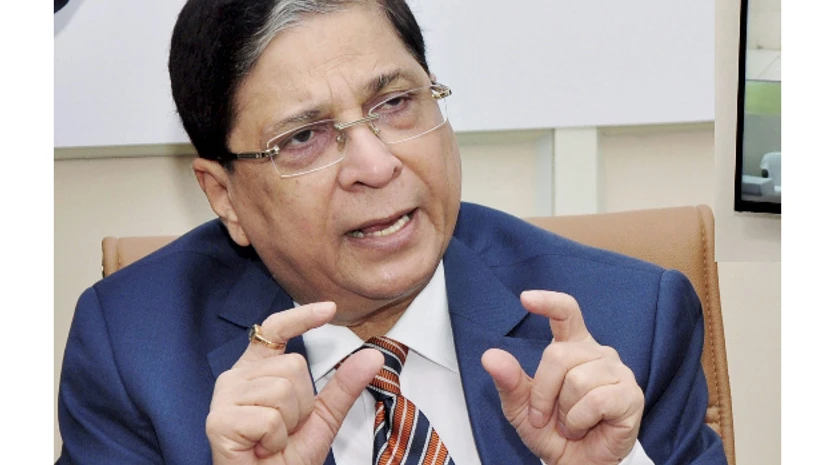Senior advocate and former law minister Shanti Bhushan on Friday filed a PIL in the Supreme Court for clarification on the administrative authority of the chief justice of India (CJI) as the 'master of roster' and seeking laying down of principles and procedures to be followed in preparing the roster for allocation of cases to benches.
He filed the PIL through his advocate and son Prashant Bhushan, who also wrote a letter to the apex court's secretary general stating that the matter should not be listed before a bench that includes CJI Dipak Misra.
The letter also said that it would be appropriate that the plea be listed before three senior-most judges of the top court for allocating it before an appropriate bench.
In the petition, the CJI has been named as one of the respondents along with the registrar of the top court.
Shanti Bhushan stated the "master of roster" cannot have unguided and unbridled discretionary powers, exercised arbitrarily by the CJI by hand-picking benches of select judges.
The PIL said the CJI's authority as the master of roster is "not an absolute, arbitrary, singular power that is vested in CJI alone and which may be exercised with his sole discretion" and such an authority should be exercised by him in consultation with senior judges.
More From This Section
This petition assumes significance as on January 12 four senior-most judges - J Chelameswar, Ranjan Gogoi, M B Lokur and Kurian Joseph - of the Supreme Court had called an unprecedented press conference and had said that the situation in the top court was "not in order" and many "less than desirable" things had taken place.
They had also raised the issue of allocation of important and sensitive PILs before "junior judges" of the apex court.
In the plea, Shanti Bhushan sought a direction prohibiting the CJI and the registrar from listing any matter contrary to the Supreme Court Rules, 2013 and Handbook on Practice and Procedure and Office Procedure or picking and choosing benches for the purpose of listing contrary thereto, with the modification of replacing Chief Justice of India' with the collegium of five senior-most judges.
The petition also sought a direction that any consultation on listing of matters by the Supreme Court Registry with the CJI must include consultation with such number of senior-most judges as the court may fix in the interest of justice.
"This petition raises issue as to extremely disturbing trend of listing matters subjectively and selectively as clearly discernible from the available data of matters recently filed and listed before only certain benches.
"This trend reflects serious erosion of independence of the judiciary, namely, this court in deciding matters objectively and independently by resorting to the method of favoured listings. As a result, justice appears to be skewed and in many cases justice may even stand denied," it said.
The plea sought limiting the discretion of the CJI in allocating cases in the absence of any procedure or rules to prevent conflict, saying these issues must be addressed for an improved administrative management of the court.
"It is submitted that in recent months there have been number of instances in which such powers have been exercised with legal malice by abusing the administrative authority conferred under the Constitution, the Rules, the Handbook of Procedure and the convention on the respondents concerned.
"As a result, the matters are being listed in a completely arbitrary and unjust manner so as to defeat interests of justice thereby undermining the administration of justice," the plea said.
A roster declares what work is assigned to high court and Supreme Court judges. The master of roster' refers to the privilege of the chief justice to constitute benches to hear cases.
It is a pre-requisite that this power must be exercised in a manner is that fair, just and transparent and in keeping with the high standards of integrity desired from the office of a CJI, the plea said.
"The absolute discretion of the CJI in allowing a particular case or disallowing another on oral mentioning is also another important aspect that needs to be scrutinised in its application and exercise. Thus, the manner in which power has been concentrated in the office of the CJI raises serious problems relating to constitutionalism and the rule of law," it said.
The plea said the Registry and the CJI appear to be "clearly interfering" with listing of matters particularly politically sensitive matters, and enlisted several cases in which there was alleged gross abuse of power in deciding benches.
"The pattern suggests that certain matters which are politically sensitive and involve either ruling party leaders and/or opposition party leaders are assigned only to certain benches."
"Although appearing to be 'routine', these listing and/or allocations are clearly designed in a particular direction so as to exclude other benches from hearing such politically sensitive matters. It is respectfully submitted that these actions and/or omissions are clearly unwarranted and unjustified and reflect a clear design on the part of the Respondents to favour a particular cause or a matter or deflect its course in some manner," it said.
Referring to a plea filed by Campaign for Judicial Accountability and Reforms calling for a CBI probe into the Medical College bribery case in which the top court had imposed Rs 25 lakh as costs on the petitioners, Bhushan claimed, "The CJI could not have heard the case as he himself was involved.

)
